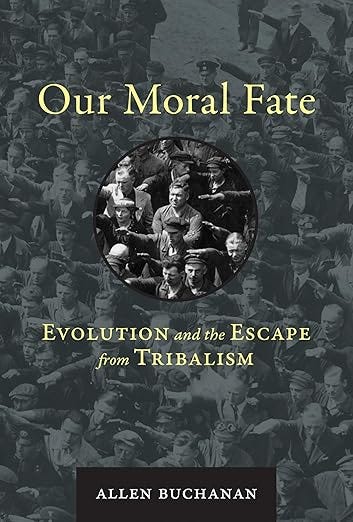Reaction: What Makes Us Human? Evolution, Intentionality and Moral Progress
reading an editorial to a special issue, symposium debating Allen Buchanan's 'Our Moral Fate. Evolution and the Escape from Tribalism'
So I am reading:
Corradetti, Claudio. “What Makes Us Human? Evolution, Intentionality and Moral Progress.” Jus Cogens 3, no. 1 (April 1, 2021): 1–10. [https://doi.org/10.1007/s42439-021-00034-5 via academia.edu] which is an editorial to a special issue of Jus Cogens 'Debating A.Buchanan's Our Moral Fate. Evolution and the Escape from Tribalism'Very enjoyable reprise, seeing terms like “niche construction” again but not from my hand, I’m beginning to feel these reactions of mine are a form of non-weekly mass wherein we remind ourselves of our selves. Only differing from the dogmatic forms by being structured as a set of questions, a lot of questions, which not an unknown form of praise for the gods, but not so much in monotheism.
Anyway, we catch up with Tomasello & Buchanan circa early mid 2010s, and cover intentionality: of the individual (whereon evolution ‘works’) through joint into collective (where that evolution is confounded) intentionality, thus:
“The I-You engagement expands into the I-You-Us, so that the Us becomes prior to the I. But then, as we will see later in the symposium dedicated to Buchanan more extensively, it arises the problem of the opposition between Us and Them (the Others).”
[After Tomasello but paraphrased] So all of the above (individual/joint/collective) becomes shared intentionality with the addition of record/memory/history/tradition/culture/origins.
“[…]selective pressures permit the emergence of moral cooperative standards that set obligations to live up to social mutual commitments.”
Then the editorial writer Claudio Corradetti themselves steps forward with:
“Morality arises from the process of self-reflection by a We-Group while performing certain collective actions. The We-Group not only acts as a group, but it knows it acts collectively as a group. By knowing this, it defines internal roles and establishes rules of fair play and redistribution: it also defines internal costumes and ways of operating. Differences between groups are based on distinct rules-practices.”
There is something useful here, in its most expanded form this we-group or circle is the world.
But Corradetti gets distracted by war and its evidence in the archaeological record, by hunting for a way to find an index for this we-grouping self-reflexivity.
“A We-Group distinguishes itself from other We-Groups based on the awareness that “this is how we do”. For such reason, I suggest that empirical evidences of such evolutionary acquisitions are to be sought in paleo-ethnological remains, i.e. traces of ceremonies, clothes, tools, drawings—and not so much in etiological evidences of collective intentional action.”
Then gets back on track by gathering more questionable praise “How does morality connect to evolutionary selection? Can we link selection mechanisms of moral progress to cultural-political niche constructions?”
“For Kitcher (2011) cultural evolution depends on the idea of ethics as an invented human “project”. 48 Far from rejecting evolutionary theory, this form of “pragmatic naturalism” 49 attempts to square the circle between Darwin’s scepticism of ethical objectivism and an unrealistic conception of morality. Whereas strict evolutionary theory, by resorting to the idea of “fitness” and “adaptation”, prevents the formulation of a proper notion of moral progress, Kitcher’s theory reconciles Darwin with our intuitions on the validity of moral judgments. Cultural competition is the evolutionary stepping stone for moral progress among human groups”
In more recent anthropology this “cultural evolution” is called “inter-group competition”. May I riff on this here:
And it is best to think of these groups, at least their basal forms as more like bands of people, including some related, some not, some both, all performing their selves in a world of inter-connections, co-operatively and competitively, in an uneasy mess tradition et al attempts to order. And yes they a more like family based music bands than any notion of nation or race, which so often shows signs of fusion of disparate elements in their unity, all the way up to empires and their fantasies.Corradetti’s editorial ends:
“Alternatively, should we imagine that universalist moralities are the result of a cognitive bootstrap (with reasoning, exchange of arguments etc.) which put us above the parameters of evolutionary theory? These are some of the questions that evolutionary morality, psychology and cognitive studies could help us answer. The symposium here dedicated to A. Buchanan’s latest book aims to offer a small but hopefully significant contribution in such direction.”
I guess I need to look that book up as well.
Buchanan, Allen E. Our Moral Fate: Evolution and the Escape from Tribalism. The MIT Press. Cambridge, Massachusetts: The MIT Press, 2020.




